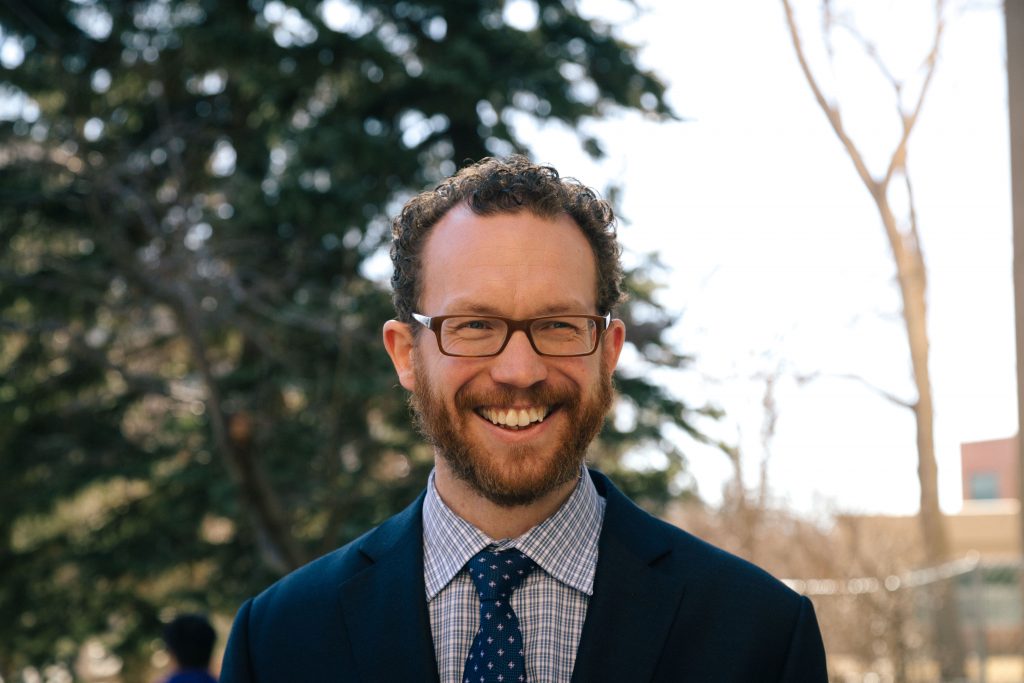
U of C faculty association considers strike fund as province tables labour legislation
By Scott Strasser, April 21 2017 —
On April 6, the Alberta government tabled Bill 7: An Act to Enhance Post-Secondary Academic Bargaining in the legislature. If it passes this spring, the bill will give post-secondary faculty associations, graduate student associations and postdoctoral fellows in Alberta the right to strike.
The bill aims to comply with a January 2015 Supreme Court of Canada decision that recognizes a charter-protected right to strike when collective agreement negotiations break down. Bill 7 also aims to align the provincial post-secondary labour relations model with existing models in the public sector. It would amend the Labour Relations Code and the Post-Secondary Learning Act (PSLA) in Alberta.

Minister of Advanced Education Marlin Schmidt. // Photo by Scott Strasser
“This brings us in line with how labour relations are dealt with all across the country,” Minister of Advanced Education Marlin Schmidt said.
The tabling of Bill 7 follows nearly two years of stakeholder consultation. Last fall, the University of Calgary Faculty Association (TUCFA) expressed several concerns with the government’s proposal. At the time, TUCFA president Sandra Hoenle worried that putting their bargaining unit under the Labour Act would have “several unintended consequences” on U of C faculty members. She was concerned the changes would classify TUCFA as a typical trade union and that some members would be exempt from the association due to their status in careers such as medicine, architecture and engineering, which are not allowed to unionize.
“Moving us out of the PSLA and under the Labour Act would not take into account the 30-plus years that we have been a bargaining unit for our members. And all the things we currently have in our collective agreement would perhaps be in question,” Hoenle said in October 2016.
Schmidt said TUCFA’s concerns were taken into account when the government drafted Bill 7.
“The concerns about losing members was directly addressed in this bill,” Schmidt said. “Professional members who are normally exempt from labour code provisions — like engineers, architects, doctors — were specifically exempted. They will continue to be members of the faculty association.”
Hoenle declined an interview. However, she published a TUCFA newsletter about the new legislation in March, outlining how the association should proceed if Bill 7 is approved. The newsletter mentioned the need to discuss “essential services” — the services that would continue to operate in the event of a strike or lockout — with the U of C Board of Governors, as well as the need to decide whether to establish a strike fund.
Regarding a strike fund, Hoenle noted in her letter that TUCFA could join the Canadian Association of University Teachers’ defence fund, establish their own strike fund, do both or do neither.

Sandra Hoenle is the president of TUCFA. // Photo by Justin Quaintance
“No matter how the government decides to proceed, there will be a profound impact on Faculty Associations and the nature of bargaining,” Hoenle wrote. “It is no exaggeration to state that this is the most significant change to the Faculty Association since we were established as a bargaining unit in the early 1980s.”
While TUCFA has never tried to strike before, faculty associations at other universities have gone on strike. University of New Brunswick faculty members went on strike for three weeks in January 2014 in demand of higher pay and better working conditions. Academic staff at the University of Northern British Columbia went on strike for two weeks in March 2015, resulting in a cancelled reading week to make up for lost class time. Most recently, the University of Manitoba Faculty Association went on strike in November 2016.
Schmidt said Bill 7 includes provisions to protect students in the case of a prolonged faculty strike. He said the government would intervene in such cases.
“In the case that a strike or lockout drags on too long and third parties are being negatively affected, the government will have the power to set up [an] emergency tribunal to look at the dispute,” he said. “A strike is a pretty extreme situation and there has to be a pretty serious breakdown with no other hope of resolving the labour dispute before it’s chosen.”
If ratified, Bill 7 would also remove compulsory binding arbitration as the de-facto method of resolving bargaining disputes when talks break down. Currently, the PSLA decrees that if collective agreement negotiations reach a stalemate, a third-party arbitrator comes in to craft a resolution that both parties have to honour. Under these rules, neither side is allowed to appeal the arbitrator’s decision to a court of law.
Schmidt said arbitration could still be used to settle disputes under Bill 7 — if the two bargaining parties agree to it.
“It’s up to the employer and the employees that arbitration is the way they want to resolve labour disagreements,” he said.
In her newsletter, Hoenle expressed concerns about the lack of a transition period provided by the new bill.
“While Bill 7 recognizes that faculty associations need to adjust to the new regulations by providing a five-year transition period to preserve the associations as they are currently constituted, the bill does not provide a similar transition period for adjusting how institutions and employees resolve labour disputes,” she wrote. “Neither has there been time to develop mechanisms for essential services. The provincial government has put us in an untenable position given that we are currently at the bargaining table.”
TUCFA’s current collective agreement expires on June 30, 2017. The association is currently bargaining a new collective agreement with U of C administration.
